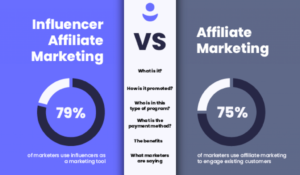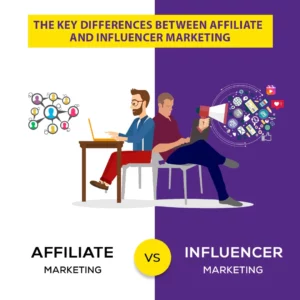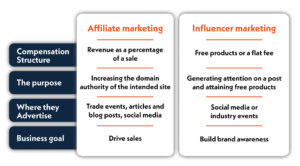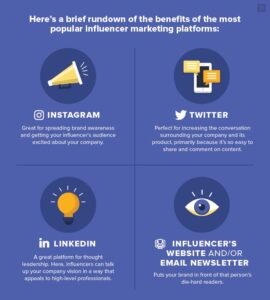Affiliate marketing is a bit like having a network of partners who promote your products and get paid for it. The way it works is pretty straightforward: businesses team up with affiliates, who are individuals or companies that promote their products. Affiliates earn a commission for bringing in customers through their marketing efforts. Usually, this involves using unique links to track who referred each sale back to them.

You have the merchants, who are the product creators or sellers; the affiliates, who do the promoting; and sometimes networks, which act as intermediaries that bring the two sides together. This setup creates a win-win situation where everybody benefits if a product sells.
click here to start your own online business for free Ced0224
Then there’s influencer marketing. This is like word-of-mouth but supercharged and online. Here, brands collaborate with influencers—people who have built credibility and a following on social media or other platforms. Influencers use their platform to talk about and recommend products to their audience, leveraging trust they’ve developed with their followers.
While both strategies aim to boost brand exposure and drive sales, they have unique qualities. Affiliate marketing often focuses on performance; the goal is driving sales and rewarding based on results. Influencer marketing, on the other hand, often centers around the personal connection and influence one person has on their followers, making it super effective for increasing brand awareness and engagement.
In terms of comparison, affiliate marketing can be seen as a more traditional and measurable approach, where results are clear-cut based on sales generated. Influencer marketing is a bit more nuanced, leveraging personal branding to embed your message in authentic content aimed at specific groups. Both methods play vital roles in a comprehensive marketing strategy, but understanding these distinctions is key to choosing the right fit for your needs.
Exploring the Benefits: What Each Approach Brings to the Table
Affiliate marketing shines when it comes to being cost-effective and scalable because businesses only pay for actual sales. This means you’re rewarding performance directly, which offers a distinct advantage for those who are mindful of their marketing budget. It’s kind of like having a payment system purely based on results. Additionally, the ability to track each click, sale, and customer action provides detailed insights which are perfect for refining campaigns over time.

On the flip side, influencer marketing excels in building genuine connections and boosting brand awareness among specific communities. This approach offers authenticity because influencers have already established trust with their audiences. When they talk about a brand, followers are more likely to listen. This can lead to higher engagement levels as followers interact with the content and ask questions.
Comparing the two, it’s important to consider their ROI. Affiliate marketing can produce a high return on investment because of its focus on sales conversion. Influencer marketing might not directly translate into sales immediately, but its potential in driving brand perception and long-term customer loyalty can be invaluable.
Let’s look at a couple of real-world examples. For affiliate marketing, an online retailer might see significant growth by partnering with a network of bloggers who recommend their products via personal stories. In contrast, influencer marketing could involve a fashion brand collaborating with a popular Instagram personality who shares day-to-day experiences with their products, capturing interest from their engaged followers.
Each marketing approach offers benefits that align differently with business goals. The choice largely depends on what you’re prioritizing at any given time and how you want to engage with your target audience. Understanding these strengths helps in tailoring marketing strategies to maximize impact and efficiency.
Choosing the Right Strategy: When to Use Affiliate or Influencer Marketing
Picking the right marketing strategy isn’t just about preference; it’s about aligning with your business objectives. Start by considering your goals. If reaching a broad audience and enhancing sales with measurable outcomes is what you need, affiliate marketing should be on your radar. Its nature of rewarding clicks and purchases suits businesses aiming to scale efficiently.
Influencer marketing, on the other hand, is ideal when your aim is to build brand affinity and connect on a personal level with target audiences. This is especially effective for brands in lifestyle, beauty, and fashion sectors where personal recommendations play a powerful role. Influencers help shape perceptions and can introduce your brand to specific groups that value their opinions.

Budget plays a pivotal role in deciding which path to take. Affiliate marketing can be more budget-friendly since costs are tied to sales performance. You pay only when you earn, making it suitable for businesses with tighter marketing budgets. Influencer marketing might require a bit more upfront investment, as influencers expect compensation for promoting products, but the reach can be massive and precise.
Furthermore, consider aligning with your brand’s identity and the audience you’re trying to reach. If your brand thrives on influence and narrative, connecting with personalities that hold sway over your desired community may provide greater returns.
Some brands have made significant strides by choosing one over the other. For tech startups, leveraging affiliates through tech blogs or review sites has proven effective in driving not just sales but also brand credibility. In contrast, emerging fashion brands have seen success by collaborating with micro-influencers whose style resonates directly with their target buyers. Picking your strategy is a matter of matching your business style and objectives to the strengths of either marketing approach.
SEO and Keyword Strategy: Drawing Eyes to Your Marketing Tactic
SEO plays a big role when using either affiliate or influencer marketing, as it boosts visibility and helps draw the right crowd to your efforts. In affiliate marketing, using long-tail keywords can significantly enhance reach. These are more specific keyword phrases that potential customers are likely to type in when they’re closer to purchasing something. Because they’re precise, they often have less competition and yield higher conversion rates.

Tools like Google Keyword Planner or Ahrefs can be invaluable in finding the perfect keywords to include in your affiliate content. By focusing on what your audience is searching for and understanding user intent, you can tailor content that draws in potential buyers.
For influencer marketing, the SEO game is a tad different. Here, it’s about harnessing the power of hashtags and trending keywords. Influencers often tap into trending topics or gallery-style hashtags to increase their content’s reach and engagement. It’s about finding the sweet spot between what’s trending and what aligns with your brand.
Collaborate with influencers who naturally incorporate your targeted keywords and hashtags. This not only extends content reach on platforms like Instagram and TikTok but also ensures the content resonates with the audience genuinely interested in your products. With influencer campaigns, it’s key to monitor and adapt based on what garners the most interaction, tweaking your keyword strategy accordingly.
Both strategies also benefit from being part of a wider SEO approach, enhancing site authority by linking back to valuable, original content hosted on your platform. This approach can drive organic traffic and boost your brand’s online presence, making your marketing efforts even more effective.
Adapting to Trends: What’s Next for Affiliate and Influencer Marketing
Digital marketing is always evolving, and keeping pace with trends is crucial for both affiliate and influencer marketing strategies. As the landscape shifts, being adaptable can turn challenges into opportunities.
One rising trend is the use of micro-influencers in campaigns. Unlike big-name personalities, micro-influencers have smaller but highly engaged audiences. They’re seen as more relatable and trustworthy, making them great partners for niches where authenticity is key. This trend reflects a broader shift towards personalized marketing, where the focus is more about building genuine community connections rather than sheer numbers.

In the affiliate space, there’s a growing emphasis on partnerships with trusted content creators who offer valuable insights. These affiliates can drive more dedicated traffic by engaging audiences through authentic content, such as reviews and how-to guides. This approach not only boosts conversions but also elevates brand credibility.
Both strategies need to navigate the changing algorithms of platforms like Instagram and YouTube. Staying informed about these updates is essential to maintain visibility and engagement. This could mean altering content presentation styles or leveraging new platform features to stay in front of an audience effectively.
Looking ahead, AI and machine learning technologies are expected to play a bigger role. These tools offer the means to analyze consumer behavior more in-depth, tailor marketing efforts more precisely, and predict trends even before they become mainstream. Both affiliate marketers and influencers who harness these technologies will likely have a competitive edge.
As consumer behavior continues to evolve, so will the tools and tactics in digital marketing.

Keeping an open mind and being ready to embrace new methods can vastly enhance the effectiveness of both affiliate and influencer marketing in years to come.
